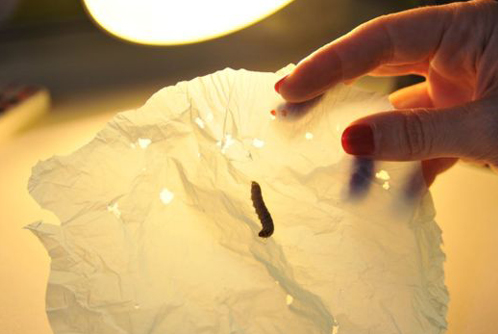(单词翻译:单击)
A caterpillar that munches on plastic bags could hold the key to tackling plastic pollution, scientists say.
科学家们称,一种吃塑料袋的毛虫或可成为解决塑料污染的关键。
Researchers at Cambridge University have discovered that the larvae of the moth, which eats wax in bee hives, can also degrade plastic.
剑桥大学的研究人员发现,这种飞蛾幼虫不仅吃蜂巢中的蜂蜡,还能降解塑料。
Experiments show the insect can break down the chemical bonds of plastic in a similar way to digesting beeswax.
实验表明,这种毛虫可以分解塑料的化学键,与其消化蜂蜡的方式类似。
Each year, about 80 million tonnes of the plastic polyethylene are produced around the world. The plastic is used to make shopping bags and food packaging, among other things, but it can take hundreds of years to decompose completely.
每年,全球约生产8000万吨塑料聚乙烯。塑料聚乙烯可用作购物袋、食品以及其他物品的包装,但这种塑料需要数百年才能被彻底降解。
However, caterpillars of the moth (Galleria mellonella) can make holes in a plastic bag in under an hour.
然而,蜡螟一个小时内就可在塑料袋上弄出一个洞。

Dr Paolo Bombelli is a biochemist at the University of Cambridge and one of the researchers on the study.
剑桥大学生物化学家保罗·邦贝利博士是参与该研究的研究员之一。
"The caterpillar will be the starting point," he told BBC News. "We need to understand the details under which this process operates. We hope to provide the technical solution for minimising the problem of plastic waste."
他告诉BBC:“蜡螟将成为一个突破口。“我们需要了解这一过程背后的运作细节。我们希望为最大限度减少塑料污染提供技术解决方案。”
Dr Bombelli and colleague Federica Bertocchini of the Spanish National Research Council have patented the discovery.
邦贝利和他的同事--西班牙国家研究委员会的费德里卡·贝尔托基尼已经给这项发现申请了专利。
They want to speed up the process of discovering the chemical secrets behind the natural degradation of plastic. They think microbes in the caterpillar - as well as the insect itself - might play a role in breaking down plastic.
他们希望加紧找出蜡螟自然降解塑料背后的化学原理。他们认为,蜡螟自身及其体内的微生物可能在分解塑料方面发挥了作用。
If the chemical process can be identified, it could lead to a solution to managing plastic waste in the environment.
如果能够确认这个化学过程,就可能会找到解决塑料垃圾污染的办法。
"We are planning to implement this finding into a viable way to get rid of plastic waste, working towards a solution to save our oceans, rivers, and all the environment from the unavoidable consequences of plastic accumulation," said Dr Bertocchini.
贝尔托基尼说:“我们正计划将这个发现转化为消除塑料污染的可行办法,努力寻找方案,拯救海洋、河流以及整个环境,使它们免于承受塑料聚积产生的无法避免的影响。”
"However, we should not feel justified to dump polyethylene deliberately in our environment just because we now know how to bio-degrade it."
“但是,我们不应该因为知道如何生物降解聚乙烯,就认为故意向自然中丢弃聚乙烯是正当的。”
The research is published in the journal, Current Biology.
这项研究发表在《当代生物学》杂志上。


